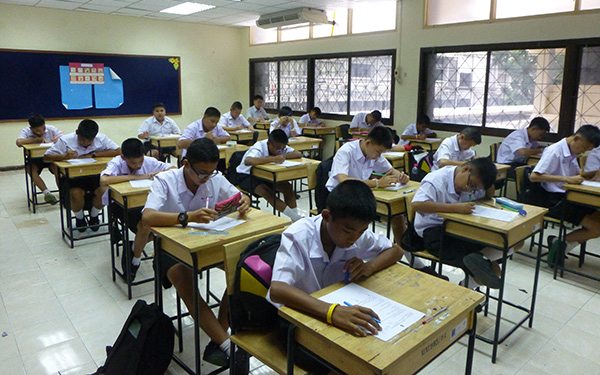While the image of the gallivanting backpacker arriving in Bangkok to teach two terms of TEFL-style English is one of the most well-known tropes of Thailand, the Kingdom’s education system is actually suffering from a lack of teachers – qualified ones, at any rate.
Thanks to comparatively low wages, and a tendency for some government schools to only pay foreign teachers for part of the year worked, many qualified teachers are heading elsewhere in the region for better opportunities.
Teachers in the STEM subjects – science, technology, engineering and – are particularly thin on the ground.
The Education Ministry have resolved to tackle this by the unusual step of recruiting unlicensed teachers to fill the gap in STEM subjects in government-run schools, reports the Bangkok Post. This is in response to the PM’s ‘Preparing the 21st Century Workforce” initiative.
These teachers would still be degree-holders in a STEM subject, yet would not possess the usually-requisite teaching licence. Chaiyot Imsuwan, spokesman for the Education Ministry, says that the Ministry is still collecting data on the number of STEM teachers at the moment, and the number of unlicensed teachers that are needed to fill the gap.
“We were told by many school principals nationwide they are having a hard time finding specialist teachers in Stem fields as the number of people coming forward to teach those subjects had declined over the past few years,” Mr Chaiyot said.
He explained that these teachers would be allowed to teach for two years without a licence by the Teachers’ Council of Thailand, and would be expected to join the necessary training programmes in that time to procure themselves a licence.
It’s unclear at this stage whether the teacher themselves would be expected to pay for the programme and licence, or whether that would be the responsibility of the school or the Education Ministry.
“If they fail to obtain a teaching licence after two years, the Teachers Council might allow them to teach for four more years maximum,” Mr Chaiyot said. “After that, if they still fail, the council would assess them based on their experience and knowledge as to whether they should be hired as teachers.”
Mr Chaiyot continued to say that the hiring initiative would start in October 2016.
Featured image is via Leaves From The Vine


